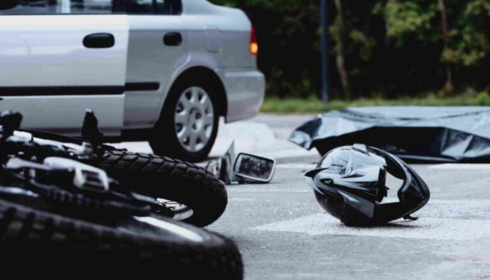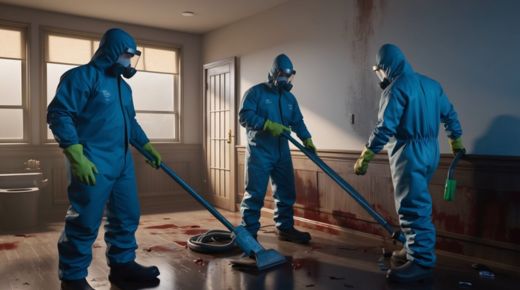Blood cleanup is a serious matter that requires careful handling. When faced with this difficult task, many wonder if they should tackle it themselves or seek professional help. Hiring certified blood cleanup professionals ensures safety and proper handling of potentially dangerous biohazards.
These experts have the right tools and knowledge to clean blood-contaminated areas thoroughly. They follow strict safety protocols to protect themselves and others from harmful pathogens. Professional cleaners also help preserve emotional well-being by removing distressing reminders of traumatic events.
Attempting to clean blood without proper training can put one’s health at risk. Professional blood cleanup services offer peace of mind, knowing the job will be done right. They handle the cleanup discreetly and efficiently, allowing those affected to focus on healing.
Know the Risks of Blood Cleanup
Blood cleanup poses serious health hazards due to harmful pathogens. Understanding these risks is crucial for anyone considering handling blood-contaminated areas.
Pathogens and Bloodborne Diseases
Blood carries dangerous pathogens that can survive outside the body. HIV, Hepatitis B, and Hepatitis C are common bloodborne diseases. These viruses can spread through contact with infected blood.
Other pathogens include bacteria like MRSA. Even small amounts of blood can harbor millions of harmful microorganisms.
Exposure can happen through:
- Cuts or open wounds
- Splashes to the eyes or mouth
- Accidental needle sticks
Proper protective equipment is essential. This includes gloves, goggles, and specialized clothing.
Consequences of Improper Cleanup
Inadequate blood cleanup can lead to severe outcomes. Cross-contamination is a major risk. This occurs when pathogens spread to clean areas.
Health impacts may include:
- Infections
- Long-term illnesses
- In rare cases, death
Legal issues can also arise. Businesses may face fines for improper biohazard handling.
Professional crime scene cleanup companies use special equipment and methods. They ensure thorough sanitization and proper disposal of contaminated materials. You can find these companies in nearly every city or nearby.
Attempting DIY cleanup can leave traces of blood. These invisible remnants can still pose health risks. Only proper techniques and cleaning agents can fully eliminate the danger.
The Importance of Professional Expertise
Professional blood cleanup requires specialized knowledge and skills. Experts have the training and tools to handle biohazards safely and effectively.
Training and Qualifications for Blood Cleanup
Blood cleanup professionals undergo extensive training. They learn about bloodborne pathogens, safety protocols, and proper cleaning techniques. This training covers:
• Personal protective equipment use •Biohazard containment methods •Safedisposal of contaminated materials •Decontamination procedures
Certified cleaners stay up-to-date on industry standards. They know how to follow OSHA regulations for handling biohazards. Many have backgrounds in fields like:
Public health MedicalsciencesForensics
This expertise helps them assess risks and choose the right cleanup approach.
Specialized Cleanup Techniques
Professional cleaners use advanced methods to remove all traces of blood and bodily fluids. Their techniques include:
• UV light scanning to detect hidden biohazards • Enzyme cleaners to break down biological material • HEPA vacuums for thorough particle removal
They also employ proper disinfection protocols to eliminate pathogens. This may involve:
• Hospital-grade disinfectants
• Ozone treatments
• Thermal decontamination
Professionals know how to clean porous surfaces like wood or fabric. They can determine when materials need removal instead of cleaning. This thorough approach prevents health risks and odors.
Safety and Compliance in Blood Cleanup
Blood cleanup requires strict safety measures and compliance with regulations. Proper procedures protect workers and the public from harmful pathogens.
Adhering to Health and Safety Regulations
Blood cleanup professionals must follow OSHA’s bloodborne pathogen standards. These rules set guidelines for handling biohazardous materials safely.
Workers need special training on bloodborne pathogens. This includes learning about transmission risks and prevention methods.
Companies must have an exposure control plan. This plan outlines procedures for handling blood and other potentially infectious materials.
Proper disposal of contaminated items is crucial. Biohazard waste bags and containers are used to safely remove materials from the site.
Regular testing and vaccinations help protect workers. Hepatitis B vaccines are often required for those exposed to blood.
Utilizing Personal Protective Equipment
Personal protective equipment (PPE) is essential for blood cleanup safety. Workers must wear PPE to avoid contact with blood and other fluids.
Standard PPE for blood cleanup includes:
- Disposable gloves
- Eye protection (goggles or face shields)
- Protective clothing (gowns or suits)
- Shoe covers
- Respirators (when needed)
PPE must be put on and removed in a specific order. This prevents contamination during the process.
Workers change PPE if it becomes torn or heavily contaminated. Used PPE is treated as biohazardous waste and disposed of properly.
Decontamination areas are set up for cleaning equipment and removing PPE safely. This helps prevent the spread of contaminants beyond the cleanup site.
Professional Cleanup Procedures and Protocols
Professional blood cleanup involves specific steps and equipment to ensure safety and thorough decontamination. Certified technicians follow strict guidelines to handle biohazardous materials properly.
Crime Scene and Trauma Cleanup
Certified blood cleanup professionals use specialized gear and techniques for crime scene cleanup and trauma cleanup. They wear personal protective equipment like gloves, masks, and protective suits to avoid exposure to bloodborne pathogens.
The cleanup team secures the area and removes visible blood and bodily fluids. They use industrial-grade disinfectants to sanitize affected surfaces. Air scrubbers help remove airborne contaminants.
Technicians dispose of biohazardous waste in special containers following legal regulations. They also decontaminate or dispose of porous materials that can’t be cleaned effectively.
Blood Spill Remediation Process
The blood spill remediation process begins with a detailed assessment of the affected area. Cleanup professionals identify all contaminated surfaces and materials.
They use enzyme cleaners to break down blood proteins before applying disinfectants. Multiple rounds of cleaning may be needed for thorough decontamination.
Technicians check hidden areas like subfloors or wall cavities for seepage. They use specialized tools to detect traces of blood not visible to the naked eye.
After cleaning, the area is sanitized again and tested to ensure all biohazards have been removed. The final step involves deodorizing to eliminate any lingering odors.
Handling Diverse Cleanup Scenarios
Professional blood cleanup services deal with a wide range of situations. They have the skills and tools to handle different settings and levels of contamination safely and effectively.
Residential and Commercial Spaces
Blood cleanup professionals can tackle messy scenes in homes and businesses. In houses, they clean bedrooms, bathrooms, and living areas after accidents or crimes. For offices and stores, they sanitize workspaces, public areas, and storage rooms.
These experts which are usually found by calling a crime scene cleanup service use special cleaners to remove blood stains from carpets, furniture, and walls. They also check for hidden spots behind baseboards or under floorboards. Their goal is to make the space safe and clean again.
In bigger buildings, they may need to work on elevators, stairwells, or lobbies. They follow strict rules to protect other people in the building during cleanup.
Vehicle and Public Area Cleanup
Cars, buses, and trains sometimes need blood cleanup too. Pros know how to clean small spaces and different materials inside vehicles. They remove stains from seats, floors, and windows.
In public areas, cleanup teams work fast to reduce risks to others. They may clean up blood in parks, streets, or sports fields. These jobs often happen at night when fewer people are around.
Certified cleaners use barriers to block off work areas. They wear protective gear to stay safe. Their methods stop the spread of harmful germs in busy places.
The Emotional Impact of Blood Cleanup
Blood cleanup can take a heavy toll on those involved. The process brings up intense feelings and can be very upsetting for friends and family.
Support and Compassionate Care
Professional blood cleanup services offer more than just cleaning. They provide emotional support during a difficult time. Trained staff understand the trauma people face after tragic events.
These experts offer a caring presence. They listen without judgment and can suggest helpful resources. Their goal is to ease the burden on grieving families.
Cleanup teams handle the practical details with sensitivity. This allows loved ones to focus on healing. The compassionate approach helps protect emotional well-being during a stressful period.
Ensuring Discretion and Privacy
Privacy is key when dealing with blood cleanup. Professional services take great care to be discreet. They use unmarked vehicles and wear plain clothes to avoid drawing attention.
Teams work quietly and efficiently. They respect the need for space and silence. Certified professionals understand the importance of confidentiality.
All information about the incident stays private. This protects the family’s privacy during a vulnerable time. Discreet service helps prevent gossip and maintains dignity for those affected.
Factors Influencing the Need for Professional Services
Professional blood cleanup or crime scene cleanup services are essential due to the risks and complexities involved. These services address important health and safety concerns while ensuring compliance with regulations.
Variety of Bloodborne Pathogens
Blood can carry many dangerous pathogens. HIV, which causes AIDS, can live in dried blood for several days. Meanwhile, Hepatitis B and C viruses can survive outside the body for weeks. MRSA, a drug-resistant bacteria, spreads through contact with contaminated blood.
These pathogens pose serious health risks. Improper cleaning can lead to infection. Professional cleaners use special equipment and techniques to safely remove all traces of blood and pathogens.
They also properly dispose of biohazard materials to prevent spread. This helps protect both cleaners and others who may come into contact with the area later.
Regulatory Aspects of Blood Cleanup Services
Blood cleanup is heavily regulated. The Occupational Safety and Health Administration (OSHA) sets strict rules for handling bloodborne pathogens. These rules cover training, personal protective equipment, and cleaning procedures.
State and local laws may add extra requirements. Professional services stay up-to-date on all regulations. They ensure full compliance to avoid fines and protect public health.
Proper documentation is also crucial. Professionals keep detailed records of cleaning procedures and disposal. This protects property owners from liability issues.






